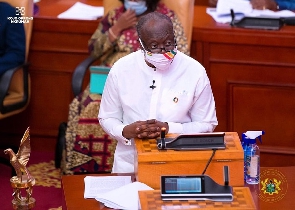 Finance Minister, Ken Ofori-Atta
Finance Minister, Ken Ofori-Atta
The passage of outstanding revenue bills by Parliament remains critical to government programmes as well as to enable the state to complete four of the five agreed prior actions in the International Monetary Fund (IMF) Staff Level Agreement.
The outstanding bills are the Income Tax (Amendment) Bill, Excise Duty and Excise Tax Stamp (Amendment) Bills as well as the Growth and Sustainability Levy Bill. These bills, according to the government, are necessary for effective budget implementation. They will also boost efforts to increase tax-to-GDP from less than 13 percent to the sub-Saharan average of 18 percent.
Together, if approved, the bills will lead to a revenue yield of approximately GH¢3.96 billion this year.
So far in addition to the domestic debt exchange programme – awaiting completion of the external debt operation – government has completed three prior action – tariff adjustment by the Public Utilities Regulatory Commission (PURC), publication of the Auditor-General’s Report on COVID-19 Spending, and onboarding of Ghana Education Trust Fund (GETFUND), District Assemblies Common Fund (DACF) and Road Fund on the Ghana Integrated Financial Management Information System (GIFMIS) – as established in the Staff Level Agreement.
In an engagement with the media on the passage of these bills, the Director of the Revenue Policy Division at the Ministry of Finance, George Swanzy Winful, noted that government programmes are largely based on these revenue measures and that if not approved, will be of dire consequences to budget implementation.
“The passing of these bills is critical as it will have serious consequences on the management of public funds if not achieved. If the bills are not passed, there may be a need to revise the revenue estimate, which will affect the mobilisation of domestic revenue,” he said.
“The government is working with the IMF in this regard and has indicated what it can contribute to show its commitment to mobilizing domestic revenue. Without the support of parliament in passing these bills, the nation may find itself in a difficult situation,” he added.
Although the situation is gradually normalising, there are still hurdles to cross to get the country to a better position. The government needs parliament’s support in passing these bills to secure a brighter future for the nation.
Growth and Sustainability Levy Bill, 2022
This bill is to impose a special levy to be known as the Growth and Sustainability Levy to raise revenue for growth and fiscal sustainability of the economy. The levy is to be imposed on profit before tax of the companies and institutions and. on· production in the case of mining, upstream oil and gas companies.
The estimated revenue for 2023 is approximately GH¢ 2.216 billion. The Levy is subject to review by the minister responsible for finance in 2025.
Per the government, this comes on the back of the Coronavirus Disease (COVID-19) pandemic which led to a significant reduction in revenues and increased expenditure, as well as the Russian-Ukraine war which has also resulted in unprecedented global crises – depreciation in currencies and impacted living conditions and inflation levels.
The Ghanaian economy has not been spared these shocks. Further interventions are required to raise additional revenue for national development and social protection for the vulnerable. The introduction of the Growth and Sustainability Levy is part of the government’s efforts to raise funds for carrying out these interventions.
Income Tax (Amendment) Bill
The Income Tax (Amendment) Bill, 2022 is to amend the Income Tax Act, 2015 (Act 896) to revise the rates of income tax for individuals and introduce an additional income tax bracket, introduce a withholding tax rate on the realisation of assets and liabilities and on winnings from lottery, unify the loss carried forward provisions and revise the treatment of foreign exchange losses and increase the optional rate for individuals on the gain from the realisation of an investment asset.
Others include revising the upper limits for the quantification of motor vehicle benefits and increasing the concessional income tax rates.
The individual personal income tax bands have been reviewed to accommodate the minimum wage for 2023 as the basic tax free income and an additional band at 35 percent as part of the high net worth taxation policy. The upper limits for quantification of motor vehicle benefits have not been revised since 2015. Government has revised these upper limits to account for inflation.
These amendments are considered necessary to support the growing economy and will lead to a revenue yield of approximately GH¢ 1.29 billion.
Excise Duty (Amendment) Bill, 2022
The Excise Duty (Amendment) Bill, 2022 is to amend the Excise Duty Act, 2014 (Act 878) to revise the excise tax rates for cigarettes and other tobacco products to conform with the Economic Community of West African States (ECOWAS) Protocols and raise revenue to mitigate the harmful effects of these excisable products; increase the excise duty in respect of wine, malt drinks and spirits; and impose excise duty on sweetened beverages and electronic cigarettes and electronic liquids to increase revenue.
The government expects to raise about GH¢455 million from this bill.